Having your own chickens provides a slew of benefits for both you and your family. What’s even better is that chickens are one of the easiest livestock to raise. You don’t even need a large farm to raise chickens, and there has been an influx of backyard chicken keepers in recent years.
One thing you may have noticed when researching chickens is just how many different breeds there are. Each breed has its own traits and attributes that you should learn before rushing out and purchasing chicks. The Orpington, for example, is one of the more popular chicken breeds, thanks to its laid back attitude and gentle nature. Keep reading to learn how to raise and care for Orpington chicken.

Raising Orpington chickens requires a balanced diet, clean water, and secure housing to protect them from predators. These birds need space to roam and forage, making them happy and healthy. Regular health checks and vaccinations are also crucial for their well-being.
Orpington chickens, with their voluminous feathers, resemble the plush teddy bears of the barnyard, making them a favorite among poultry enthusiasts and children alike. This breed’s calm demeanor allows for easy handling, making them ideal pets for families. However, their thick feathers can be a double-edged sword, especially in warmer climates. It’s essential to provide adequate shade and water during hot weather to prevent overheating. Regular grooming is also necessary to keep their feathers clean and parasite-free.
One crucial aspect of caring for Orpington chickens that should not be overlooked is their susceptibility to certain health issues, such as obesity and broodiness. Just like a well-oiled machine requires regular maintenance to function optimally, these chickens need consistent monitoring and a carefully managed diet to avoid weight-related problems. Ensuring they have enough space to exercise and a diet that isn’t overly rich in fats is key. Additionally, be prepared to manage their broody nature, as Orpington hens often wish to sit on eggs, whether they are fertile or not. This characteristic can be managed with regular egg collection and providing distractions during their broody phases.
How Big Does Orpington Chickens Grow?
The tallest chicken breed is the Malay chicken, which can reach heights of up to 3 feet tall (36 inches). The Orpington chicken doesn’t grow as big as the Malay chicken, but that doesn’t mean it is a small bird.
Orpingtons are fairly tall birds, with the hens averaging at about 11 inches tall and the roosters coming in at 15 or more inches tall. This bird has thick feathering, short legs, a curved back, and a red wattle.
What Is The Average Weight Of An Orpington Chicken?
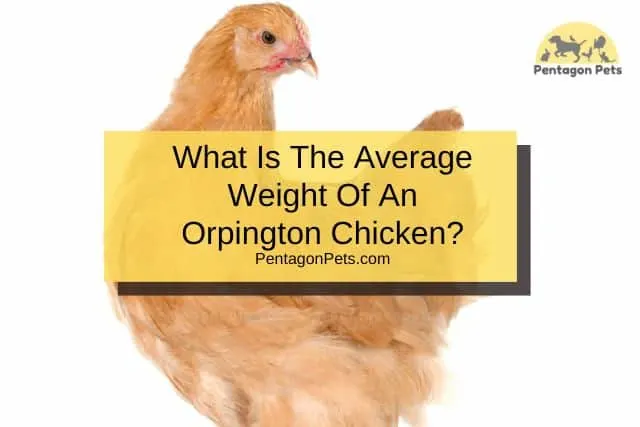
Chickens can weigh anywhere from a couple of pounds to over 10 pounds, depending on the breed and variety. The Orpington chicken is considered a medium to large breed, which makes it suitable as a table bird.
The average weight for an Orpington chicken is about 7 to 10 pounds for males and 6 to 7.5 pounds for females. Keep in mind that this is merely an average weight, and some Orpington chickens can way more or less. Orpington bantams, for example, weigh between 3 and 4.5 pounds.
When Will An Orpington Chicken Start Laying Eggs?
As with everything else, when a chicken starts to lay eggs will vary depending on the bird’s exact breed. For example, the Plymouth Rock and Rhode Island Red are considered early layers who start laying eggs before they reach 5 months old.
Orpingtons, like other non-hybrid chicken breeds, typically start laying eggs between 5 and 7 months of age. Keep in mind that if the bird isn’t healthy, both mentally and physically, then it can have a direct impact on the age when the Orpington begins laying eggs.
Will Orpington Chickens Lay White Or Brown Eggs?

White eggs are probably the type of egg you are used to seeing, especially if you get your eggs from grocery stores. But white is far from the only egg shell color that chickens can produce.
Orpingtons lay light to medium brown eggs that are large in size. These eggs are slightly bigger than the large white eggs you generally purchase at grocery stores. You should expect between 200 and 280 eggs a year from this breed.
Do You Need A Same Breed Rooster To Get An Orpington Chicken To Lay Eggs?
Roosters provide many benefits, including fertilizing the eggs and protecting the flock. But are they necessary for Orpington chickens to lay eggs?
Orpington hens only need a rooster if you want the eggs to be fertilized. If you only want the eggs to be consumed, then the Orpington hen will lay eggs with or without a rooster present. Even then, you can use any breed of rooster to fertilize the eggs.
If you do use a different breed of rooster, the chicks from that union will be a combination of the hen’s breed and the rooster’s breed. This is not uncommon in flocks and won’t cause any issues for the chicks.
What Is The Lifespan Of An Orpington Chicken?
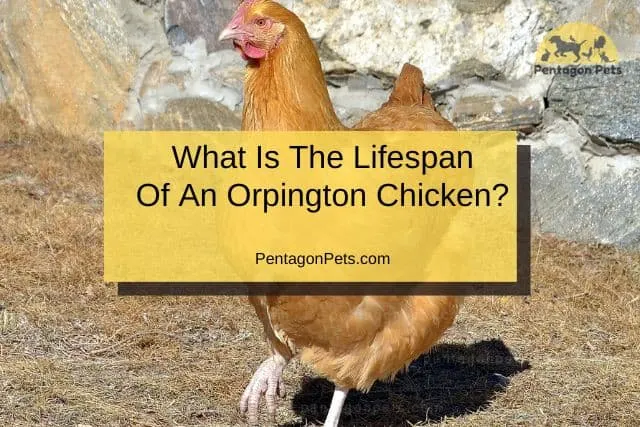
Chickens typically do not have a very long lifespan, which can be both a good and bad thing, depending on why you are raising them.
Orpington chickens have an average lifespan of between 5 to 10 years, and typically reach maturity at 20 to 22 weeks. This is a dual-purpose bird that can be raised for both its meat and its egg production.
Are Orpington Chickens Friendly?
Whether or not a chicken breed is friendly is not an aspect that you should overlook. Just think about how many times you will come in contact with your chickens. Do you really want to deal with an unfriendly and aggressive bird every time you try to collect eggs?
Despite its large size, the Orpington is a gentle breed that loves attention. They are not aggressive and actually enjoy being handled. These birds are a good choice for families or anyone who wants an easy-going and friendly chicken.
Unfortunately, their docile nature means they are not a good option for mixed flocks with aggressive chicken breeds. The more aggressive birds can quickly dominate and harm the Orpington.
How Many Eggs Can An Orpington Chicken Lay A Day?
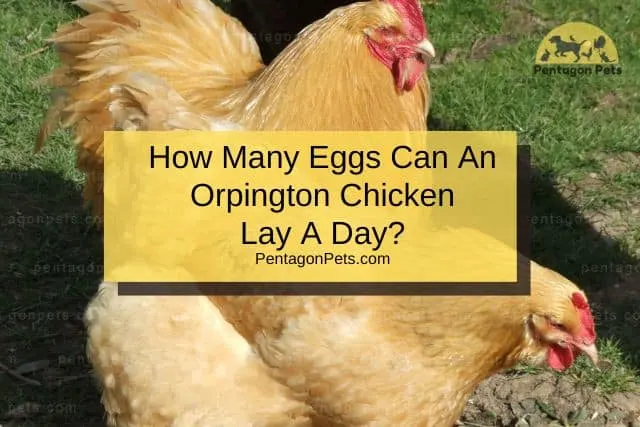
The amount of eggs a hen can lay in one day varies greatly from one breed to the next. Because Orpingtons are a dual-purpose breed, they do not lay as many as some chickens breed for egg production, but that doesn’t mean they cannot provide you with an abundance of eggs.
Orpingtons are good layers who can lay 3 to 5 eggs a week, which is about 260 eggs a year. Because they lay so many eggs, you should visit the coop twice a day, once in the morning and once in the evening, collecting the eggs you find.
Some people find that their flock is laying too many eggs for them to use, which can quickly become a problem. Thankfully, there is no shortage of people wanting farm fresh eggs, and you can quickly get rid of excess eggs by either giving them to family or friends, or selling them at your local farmers market.
When Will An Orpington Chicken Stop Laying Eggs?
While it is only natural for a hen to stop laying eggs as they get older, some breeds can still continue to lay eggs even when they are reached their senior years.
Orpingtons typically begin to slow down their egg production when they reach 3 years of age. However, it is not uncommon for Orpington hens to continue to lay until they are 6 or more years old.
If your hen has stopped laying eggs and they are 3 years old or younger, there may be a health issue causing the problem. Stress, nutritional deficiencies, and light can all have a negative impact on the hen’s ability to lay eggs. If, however, your hen is older than 3, then the reduction in their egg production is probably due to the bird getting older.
At What Age Is An Orpington Chicken The Most Delicious?
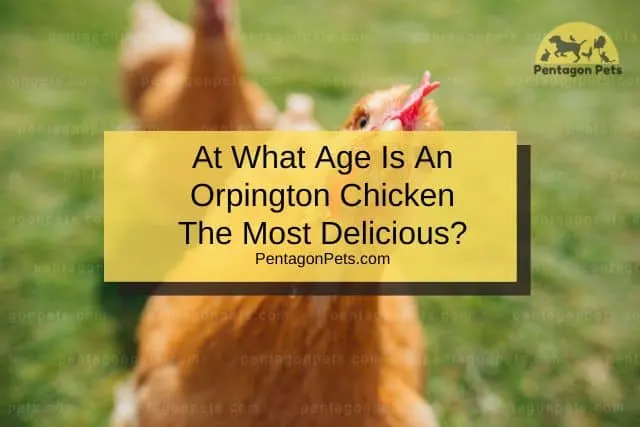
Since the Orpington chicken is a dual-purpose breed, you may be raising them for their meat. If so, then you will want to know when is the ideal age to harvest this bird.
Orpington chickens are typically butchered at about 22 weeks of age. This is when the meat is the most tender, which means it will taste the best. That doesn’t mean, however, that you cannot harvest the meat when the bird is older, but it can affect the taste of the meat.
If you do butchered an older Orpington chicken, consider using the meat in stews. Cooking the older meat slowly will help tenderize it and make it taste better.
One of the benefits of raising Orpington chickens for their meat is that this breed is typically ready to harvest before other chicken breeds. This means you are paying for less food and less housing since you are butchering them younger.
Best Housing Setup For Orpington Chickens
While it may seem like every chicken breed has the same requirements for their home, this just simply isn’t the case. Some chickens need more space, while others need less.
The best housing setup for Orpingtons would have plenty of space for these birds’ fluffiness. This means giving each bird at least 4.5 square feet of coop space and at least 10 square feet of coop space. Remember, this is floor space and not the overall size of the coop.
For example, if you have 4 birds, you should have no less than 18 square feet of coop space and 40 square feet of run. Additionally, Orphington will need 12×12 nesting boxes, and it is recommended to have one nesting box per every 3 hens. You should also provide them with a roosting space that is 12 to 14 inches wide per bird.
Typical Health Problems Of An Orpington Chicken
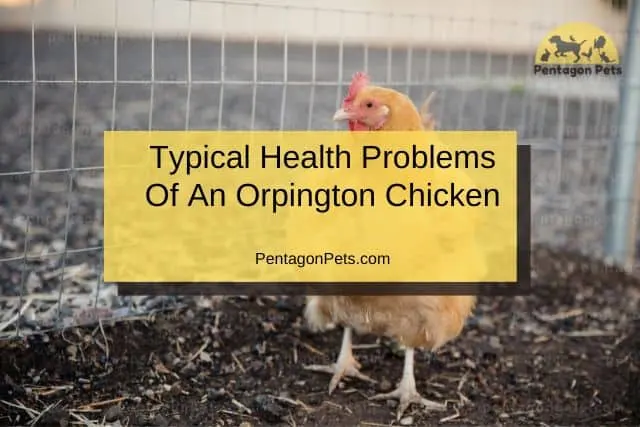
While all chickens have health problems, some breeds experience more issues than others. The Orpington chicken, for example, is one of the breeds that deals with little health problems.
The only real health issue that affects the Orpington, other than the normal chicken problems, is the potential for heatstroke. This breed has dense feathers, which can quickly cause them to overheat in warm weather.
Thankfully, you can help prevent your birds from experiencing heatstroke by providing them with cool, fresh water every day and giving them frozen treats to help keep them cool. Increasing ventilation in the coop, setting up misters, using fans, and avoiding overcrowding will also go a long way to stopping heatstroke.
This article was first published on March 29, 2023 by Pentagon-Pets.
Typical Problems Raising Orpington Chickens
One of the great things about Orpington chickens is that they don’t have many problems that you need to worry about. This makes them one of the easier birds to raise.
Along with heatstroke, Orpington chickens also have a big appetite, which means they can quickly become overweight and cost you more money in feed. The truth is, Orpingtons would much rather sit near their feeder waiting for food than go and forage.
When a hen becomes overweight, they are more likely to experience health issues, such as egg binding, which can prove life threatening.
What Type Of Food Is Best For Orpington Chickens?
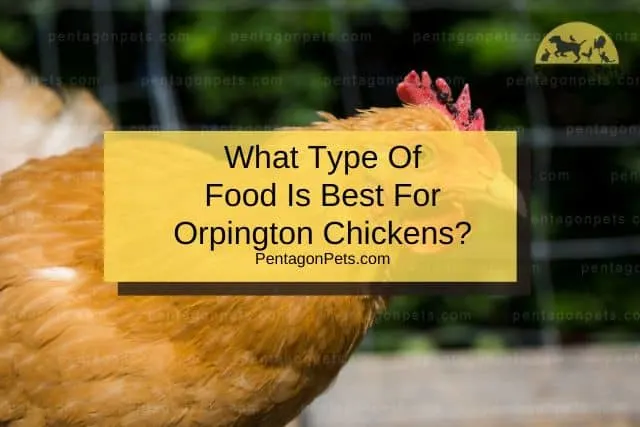
The food you feed your birds can make or break your success in raising chickens. If you want healthy birds, you will feed them a high quality commercial feed and supplement that food with grains, seeds, fruits, and vegetables.
The best food for Orpington chickens will vary depending on their age and the reason why you are raising them. For example, if you are raising the birds for eggs, you will feed them a layer feed, while broiler feed will be used if you are raising them for their meat.
Pentagon Pet is the owner of this article that was first published on March 29, 2023.
Don’t forget that you will also need to provide your flock with fresh water daily, as well as fresh fruits and vegetables. Supplements may also be needed, depending on what is included in the food you are feeding them. Mealworms are another food source that you can give the Orpington. Just remember that mealworms should never be used as a replacement for a high quality chicken feed and should instead be given as a treat only.
Related Articles
How To Raise And Care For Leghorn Chicken
How To Raise And Care For Isa Brown Chicken
How To Raise And Care For Australorp Chicken
How To Raise And Care For Bovan Chickens
This article and its contents are owned by Pentagon Pets and was first published on March 29, 2023.
